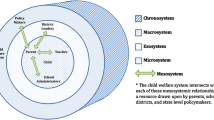Abstract
This phenomenological study explored six single mothers’ experiences of support at their young children’s school. Themes resulting from interpretative phenomenological analysis suggest the single mothers experienced tangible (e.g., school resources, school-wide events, structural flexibility, teachers’ formal communication) and intangible (e.g., caring relationships with school faculty and staff, experiencing teachers as parenting partners, perceiving acceptance from the school environment) forms of support from their children’s school. Furthermore, results suggest these single mothers experienced intangible supports more prominently than tangible forms of support. The support needs of these single mothers at their young children’s school were also explored including the mothers’ desire for stronger relationships with other parents and families at the school.

Similar content being viewed by others
References
Bernhard, J. K., Lefebvre, M. L., Kilbride, K. M., Chud, G., & Lange, R. (1998). Troubled relationships in early childhood education: Parent-teacher interactions in ethnoculturally diverse childcare settings. Early Education & Development, 9(1), 5–28.
Brocki, J. M., & Wearden, A. J. (2006). A critical evaluation of the use of interpretative phenomenological analysis (IPA) in health psychology. Psychology and Health, 21(1), 87–108. doi:10.1080/14768320500230185.
Broussard, C. A. (2010). Research regarding low-income single mothers’ mental and physical health: A decade in review. Journal of Poverty, 14, 443–451. doi:10.1080/10875549.2010.518003.
Broussard, C. A., Joseph, A. L., & Thompson, M. (2012). Stressors and coping strategies used by single mothers living in poverty. Journal of Women and Social Work, 27(2), 190–204. doi:10.1177/0886109912443884.
Bruckman, M., & Blanton, P. W. (2003). Welfare-to-work single mothers’ perspectives on parent involvement in head start: Implications for parent-teacher collaboration. Early Childhood Education Journal, 30(3), 145–150.
Bryan, J., & Henry, L. (2012). A model for building school—family—community partnerships: Principles and process. Journal of Counseling & Development, 90, 408–420. doi:10.1002/j.1556-6676/2012.00052.x.
Cairney, J., Boyle, M., Offord, D. R., & Racine, Y. (2003). Stress, social support and depression in single and married mothers. Social Psychiatry and Psychiatric Epidemiology, 38, 442–449. doi:10.1007/s00127-003-0661-0.
Caprara, G. V., Barbaranello, C., Pastorellie, C., Bandura, A., & Zimbardo, P. G. (2000). Prosocial foundations of children’s academic achievement. Psychological Science, 11(4), 302–306.
Crnic, K. A., & Booth, C. L. (1991). Mothers’ and fathers’ perceptions of daily hassles of parenting across early childhood. Journal of Marriage and the Family, 53, 1042–1050. doi:10.2307/353007.
Crosier, T., Butterworth, P., & Rodgers, B. (2007). Mental health problems among single and partnered mothers. The role of financial hardship and social support. Social Psychiatry and Psychiatric Epidemiology, 42(1), 6–13. doi:10.1007/s00127-006-0125-4.
Halgunseth, L. (2009). Family engagement, diverse families, and early childhood education programs. Young Children, 64(5), 56–58.
Hall, L. A., Gurley, D. N., Sachs, B., & Kryscio, R. J. (1991). Psychosocial predictors of maternal depressive symptoms, parenting attitudes, and child behavior in single-parent families. Nursing Research, 40(4), 214–220.
Hao, L., & Brinton, M. C. (1997). Productive activities and support systems of single mothers. American Journal of Sociology, 102(5), 1305–1344. doi:10.1086/231085.
Jackson, A. P. (1998). The role of social support in parenting for low-income, single, black, mothers. Social Service Review, 72, 365–378.
Lipman, E. L., & Boyle, M. H. (2005). Social support and education groups for single mothers: A randomized controlled trail of a community-based program. Canadian Medical Association Journal, 173(12), 1451–1456. doi:10.1503/cmaj.050655.
Melson, G. F., Windecker-Nelson, E., & Schwarz, R. (1998). Support and stress in mothers and fathers of young children. Early Education and Development, 9(3), 261–268. doi:10.1207/s15566935eed0903_4.
National Institute of Mental Health. (2009). Fact sheet on stress. Retrieved from http://www.nimh.nih.gov/health/publications/stress/index.shtml.
Olson, S. L., Ceballo, R., & Park, C. (2002). Early problem behavior among children from low income, mother-headed families: A multiple risk perspective. Journal of Clinical Child and Adolescent Psychology, 31(4), 419–430.
Peden, A. R., Rayens, M. K., Hall, L. A., & Grant, E. (2004). Negative thinking and the mental health of low-income single mothers. Journal of Nursing Scholarship, 36(4), 337–344.
Schlee, B. M., Mullis, A. K., & Shriner, M. (2009). Parents’ social and resource capital: Predictors of academic achievement in early childhood. Children and Youth Services Review, 31(2), 227–234. doi:10.1016/j.childyouth.2008.07.014.
Schrag, A., & Schmidt-Tieszen, A. (2014). Social support networks of single young mothers. Child and Adolescent Social Work Journal, 31, 315–327. doi:10.1007/s10560-013-0324-2.
Skipstein, A., Janson, H., Kjeldsen, A., Nilsen, W., & Mathiesen, K. S. (2012). Trajectories of maternal symptoms of depression and anxiety over 13 years: The influence of stress, social support, and maternal temperament. BioMed Central Public Health, 12, 1–11. doi:10.1186/1471-2458-12-1120.
Smith, J. A., Flowers, P., & Larkin, M. (2009). Interpretative phenomenological analysis: Theory, method, and research. London: Sage.
Turner, H. A. (2006). Stress, social resources, and depression among never-married and divorced rural mothers. Rural Sociology, 71(3), 479–504.
Author information
Authors and Affiliations
Corresponding author
Rights and permissions
About this article
Cite this article
West, E.M., Miller, L.G. & Moate, R.M. Single Mothers’ Experiences of Support at Their Young Children’s School: An Interpretative Phenomenological Approach. Early Childhood Educ J 45, 379–391 (2017). https://doi.org/10.1007/s10643-016-0802-1
Published:
Issue Date:
DOI: https://doi.org/10.1007/s10643-016-0802-1




